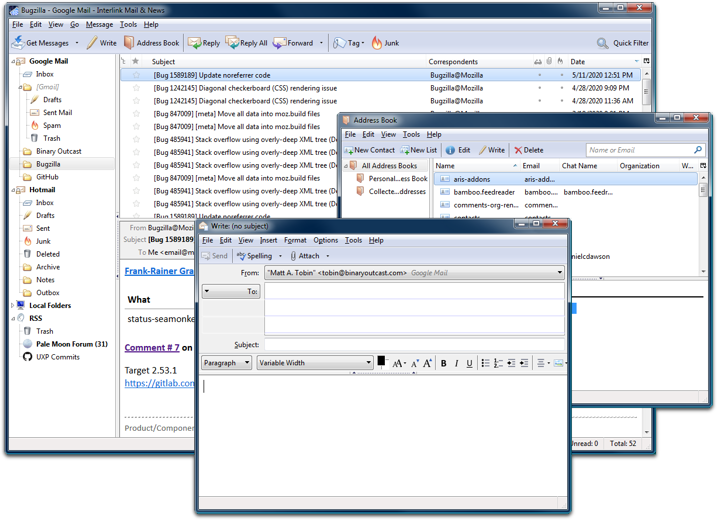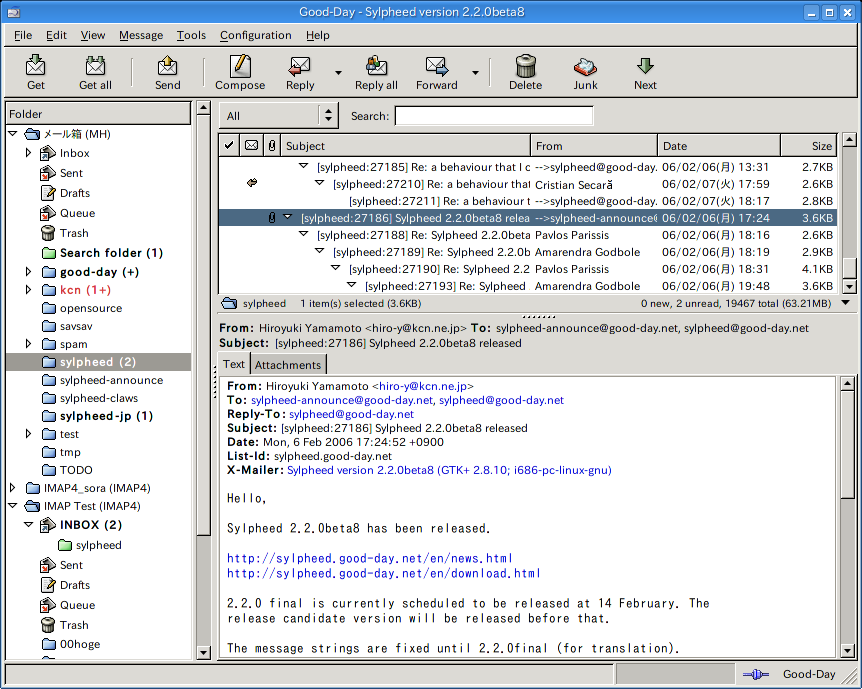Why Choosing an Open Source Secure Email Service over Proprietary Email is a Good Idea
Today more and more organizations opt to go the open source route and email services are among them.
Why is that? In this article, we’ll explore the benefits that open source offers over proprietary when it comes to email services and also introduce to you some excellent open source email clients that you can check out for yourself.
Let’s get started.
What is Open Source?
First, just what is “Open Source”?
Technically, an “open source” technology is available to the public for inspection and is highly transparent.
However, such a definition of open source is too narrow and doesn’t really explain the heart of it.
Open source is much more than a highly transparent technology accessible publicly. It is a free exchange of ideas and collaboration in the community. It is not just about creating a software (though that is important also), but is about creating a high-quality product that benefits the global community.
What are the Advantages of Open Source Secure Email Services over Proprietary Email Services?
Open source secure email services offer several advantages over their proprietary counterparts in any industry and email is no different.
So let’s see what are the advantages when it comes to open source secure email services:
1. Product Quality Validated by the Community
This is not to say that proprietary software lacks quality or that open source is always superior in quality to it.
However, open source solutions, including secure email services, must listen much more to its community for feedback and this pushes them to adopt higher and higher security and privacy standards and to introduce new features and solve problems much faster than proprietary ones.
This is why most secure email services offer their code freely to be inspected by experts on sites like GitHub.
2. Offers a More Secure Service
Since open source code is available to anyone, usually all developers have to do is go to Github and find the code there.
Here, they can review it, find any vulnerabilities and bugs in it and fix them. This would simply not be possible with proprietary solutions where a simple patch can take months to come out.
What this leads to are bug-free software and more secure emails.
3. Freedom and Flexibility for the User
Although it’s not something that happens every day, there’s still a good chance that a vendor might lock-in a software (either orphaned or the one they bought).
The best example of this is PGP or Pretty Good Privacy, which is an end-to-end encryption technology developed by PGP Corporation, but in 2010, Symantec acquired the company and since then PGP encryption is their proprietary software.
However, in the meantime, PGP Inc proposed the OpenPGP standard to the IETF and thus the OpenPGP Working Group is born.
As you can see, without OpenPGP, end-to-end encryption would be far less accessible to the public.
4. They are More Cost-Effective
Open source encrypted email is not free. The companies behind them still need to make money.
However, they are usually significantly more cost-effective than proprietary email services.
This is because proprietary solutions are often dependent upon licensing fees, which can drive prices of the product up, while open source solutions don’t face that problem.
In any case, the customer ends up as the winner.
Best Open Source Email Clients for Individuals and Enterprise
Next, let’s take a look at some of the best open source email clients that you can check out for both individuals and enterprises, including their main features and a brief description of each.
1. Mozilla Thunderbird

Mozilla Thunderbird is probably by far the most well-known open source email client software on the market and that is for a good reason.
This software offers a multitude of useful features as well as a simple user interface and the ability to maintain several mail accounts and view them all at once or one at a time. It is also compatible with the “big three” operating systems (Windows, macOS and Linux).
Main Features:
- Inbox Tab – Everything an email inbox is supposed to have, including: compose new email, draft email, reply, forward email, delete email, etc;
- Tasks – Have a task that you need to do? Just schedule it for a particular day and it will show up in your Calendar. Speaking of which;
- Calendar – Here you can see the Tasks you’ve scheduled as well as other important dates that you put in here;
- Search & Sort Email – Mozilla Thunderbird offers you several ways to search and sort your emails for better visibility. This includes: Standard Search (by keyword or phrase), Filter Search (by filtered emails) and Quick Filter (by contacts, attachments, tags, etc.);
- Offline Mode – Yes, you don’t need to be connected to the Internet to use this open source mail client. So for instance, if you’re worried about data breaches, you can turn on this mode;
- Chat – Sometimes a quick chat does a better job than sending an email, so Thunderbird also offers an in-built chat service.
2. Zimbra

Zimbra is an open source mail client software that works both online and in situations where the Internet connection is poor or there’s simply no Internet, offline mode.
In addition, unlike many open source email clients on this list, Zimbra works on all three big operating system platforms, Windows, macOS and Linux.
Main Features:
- Mail – Exactly what you would expect to find in this section. This houses all your necessary email tools such as inbox, outbox, trash, compose email, sent folder, drafts, etc;
- Calendar – Check your upcoming important dates, including tasks and events and schedule new ones;
- Tasks – Create new Tasks and add them to the Calendar for later viewing. Also, you can add a description for each Task;
- Offline Mode – No Internet or poor connection? Or maybe you want to disconnect from the network yourself to safeguard any personal information? Just use Offline Mode;
- Address B00k – Add senders along with their contact info here and access them quickly when you need to send emails to them;
- Local Folders – Save your important emails messages in a local folder and import or export them in a WinRAR format.
3. Interlink

Interlink is a Mozilla-sourced community-based email client available for Windows and Linux that allows you to manage multiple accounts and access them from one place.
Main Features:
- Mail Tools Panel – This houses all the necessary tools to manage, create and view your emails, including: inbox, outbox, trash, drafts, sent emails, etc;
- Filter & Search – Like the names suggest, with filter you can filter your emails based on tags, attachments, contacts, etc, while search allows you to search your inbox using a specific keyword or phrase;
- Message – In this tab, you can compose, reply, forward to, tag, archive your emails;
- View – Here you can change the way your emails looks, including their layout, headers, zoom level, etc;
- Activity Manager – From here you can check your current and previous activities in your email client, such as downloaded or forwarded emails;
- Offline Mode – Turn this mode on if you want to disconnect the email client if you don’t have a secure Internet, without actually turning off the Internet itself.
4. Claws Mail

Claws Mail is a very user-friendly open source email client that works on Windows and several Linux distros including Debian, Ubuntu and Fedora that allows you to perform all your email-related tasks and manage multiple mail accounts.
It started as a fork of Sylpheed (we’ll talk about it next) in 2005 (Sylpheed-Clas) and later changed the name to Claws Mail. Since 2020, both Claws Mail and Sylpheed are developed separately.
Main Features:
- Side Tools Panel – From here you can quickly access your inbox, drafts, trash, sent mail for one or all your email accounts;
- Filters – This allows you to filter your emails by keyword, phrase, date, name, etc;
- Message – Here you can compose new email, forward email, reply to email, delete emails and so on;
- View – Change the way your email software looks by turning fullscreen off/on, expanding or hiding all threads, showing all headers, etc;
- Offline Mode – Disconnect the email client from the Internet and prevent synchronization with the email service provider if you don’t have a secure Internet connection.
5. Sylpheed

Sylpheed is an open source email client for Windows, macOS, Linux and Unix that includes all the necessary features to manage your email. However, this mail client doesn’t support graphics and the UI is a bit dated.
Main Features:
- Email Tools Panel – Access the inbox, drafts, trash, sent mail, etc. from this panel;
- Message – compose, reply to, forward your emails and select to which email account you want to receive messages;
- Get All – Receive all your emails of all your mail accounts from one place;
- Address Book – manage, store and retrieve your email contacts;
- Delete Duplicate Messages – This useful feature allows you to find and remove all duplicate emails easily;
- Import/Export Mail Data – Here you can import or export your email data in UNIX Mbox, DBX or EML formats.
Looking for a Secure Email Service with End-to-End Encryption?
Open source email services are becoming increasingly popular and more and more are choosing them over proprietary email providers and clients for both business and personal usage.
CTemplar is a private email service that offers 100% audited and open-sourced code and protects user data with the top-of-the-class public key and private key combination, as well as two-factor authentication and spam protection.
We use PGP end-to-end encryption for the best protection of your email user data from third parties. In addition, our mail servers are located in Iceland, which has the best privacy laws in Europe.
We also recently released the code for our mobile apps as open source and you can check it here. This includes both mobile apps for iPhone and Android devices.
Looking for a secure end-to-end encrypted email service to protect your privacy that just so happens to be open-source? Try CTemplar and protect your privacy!